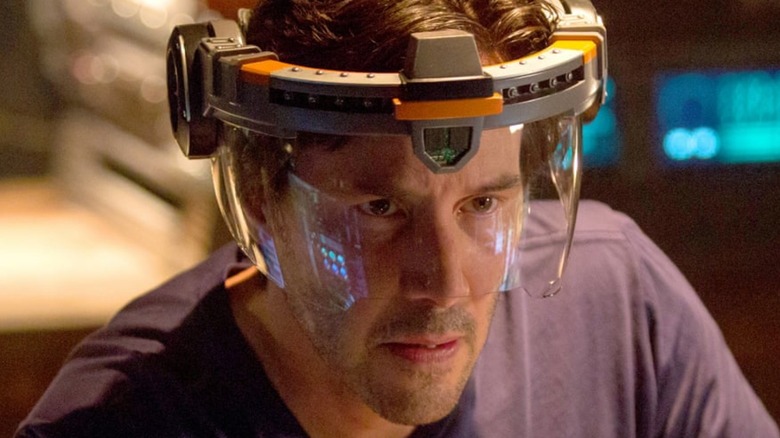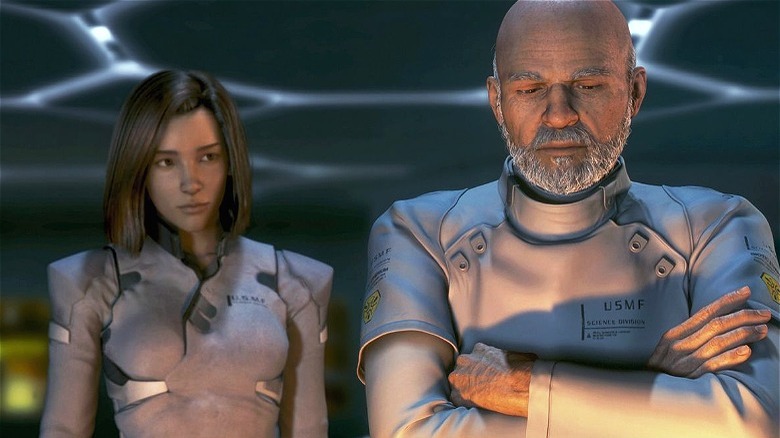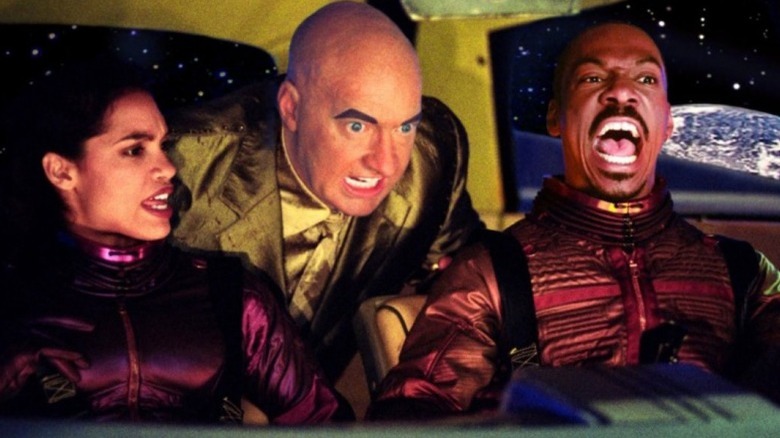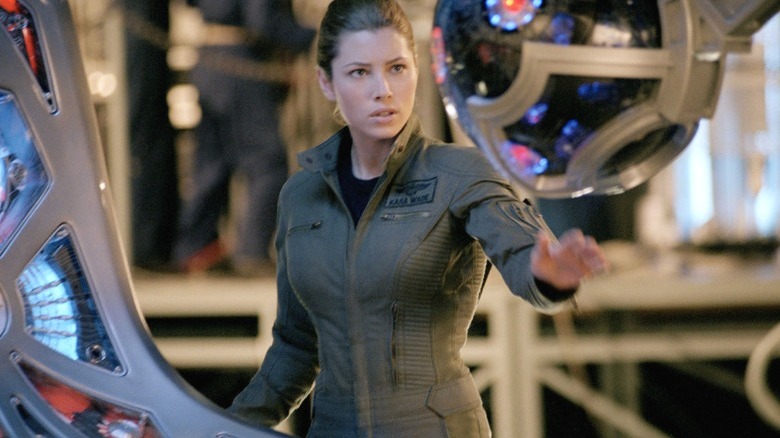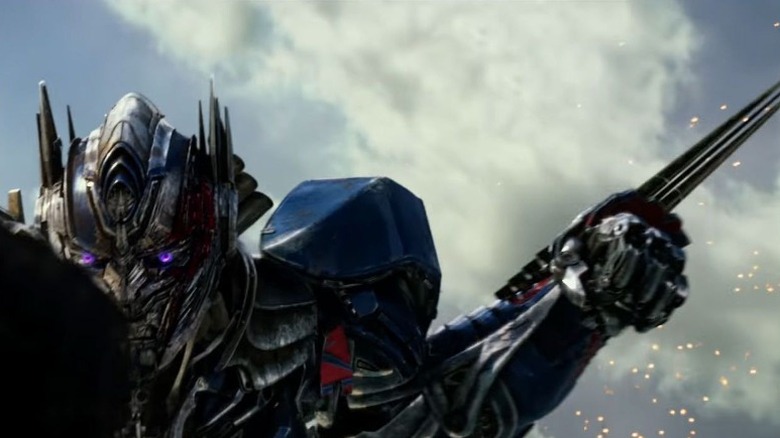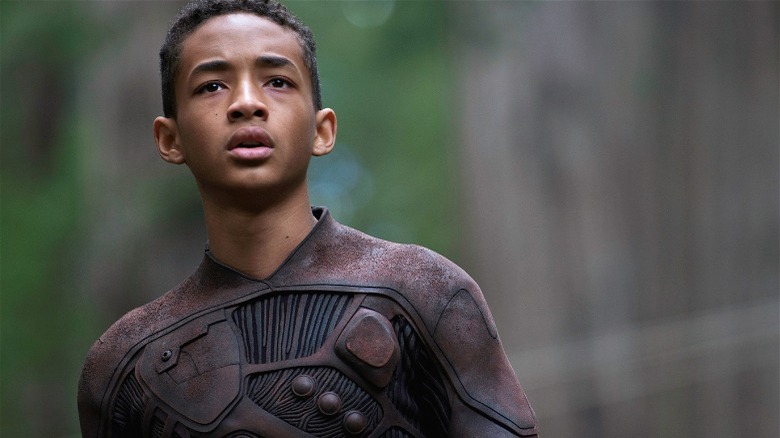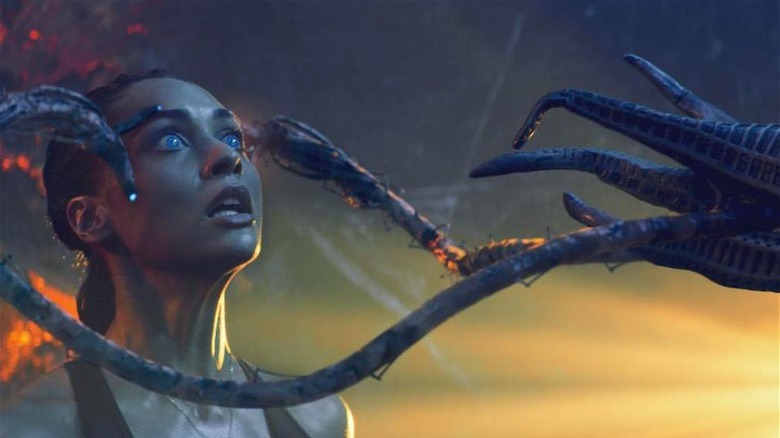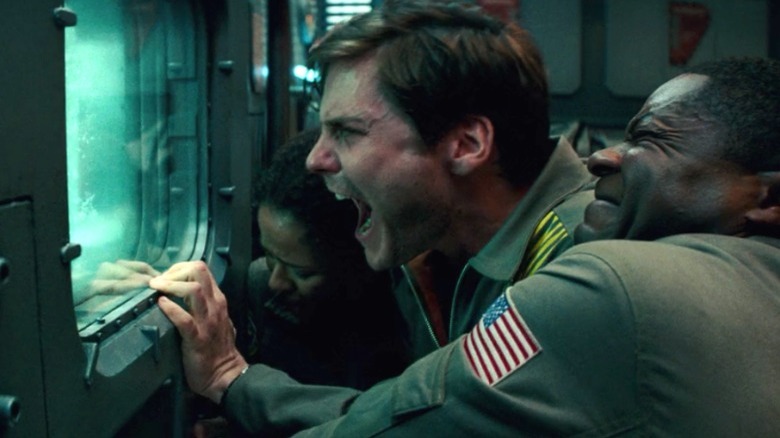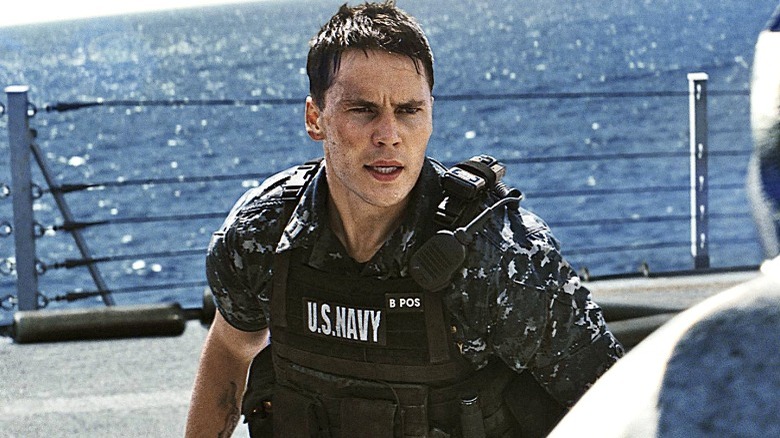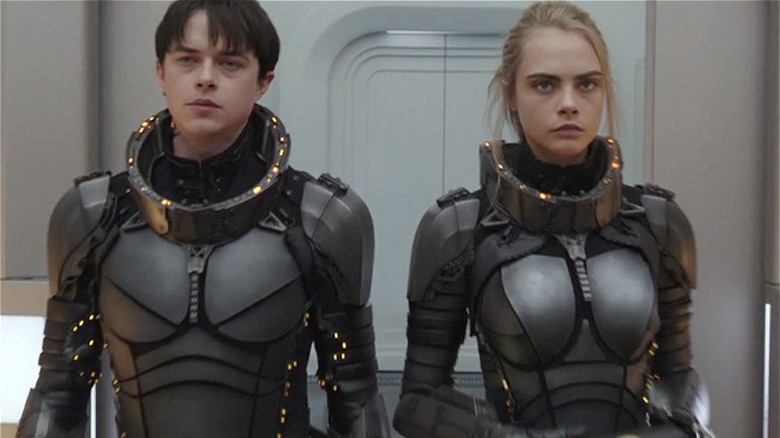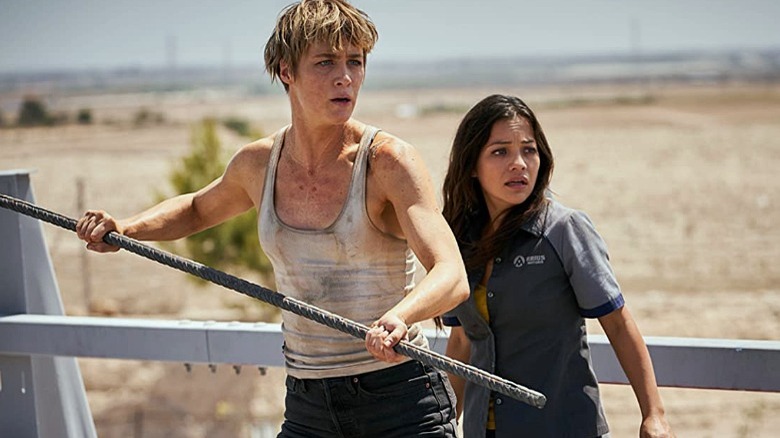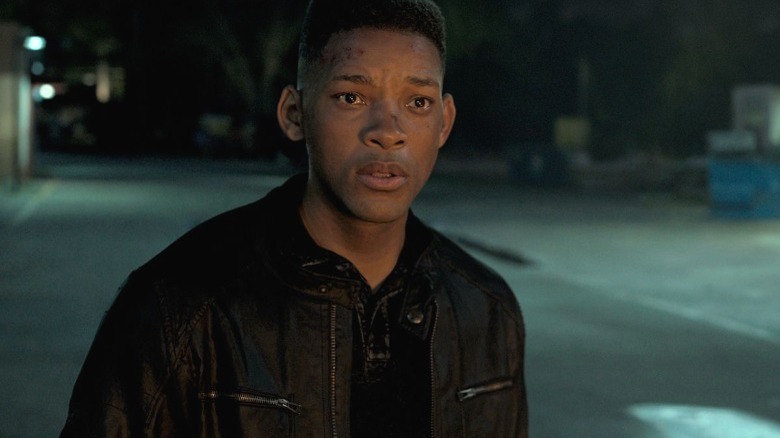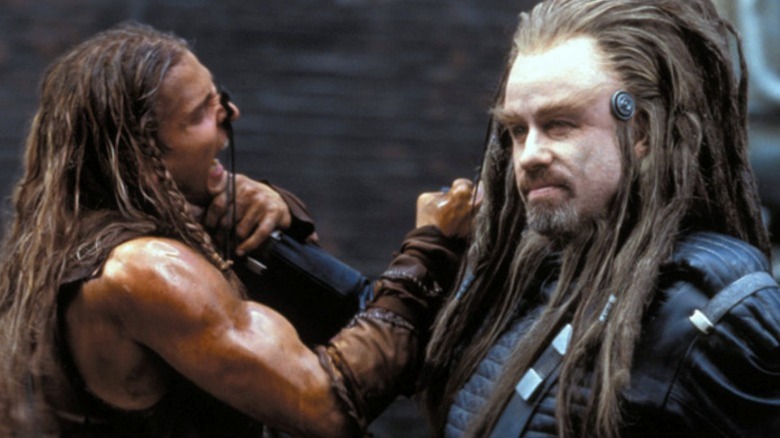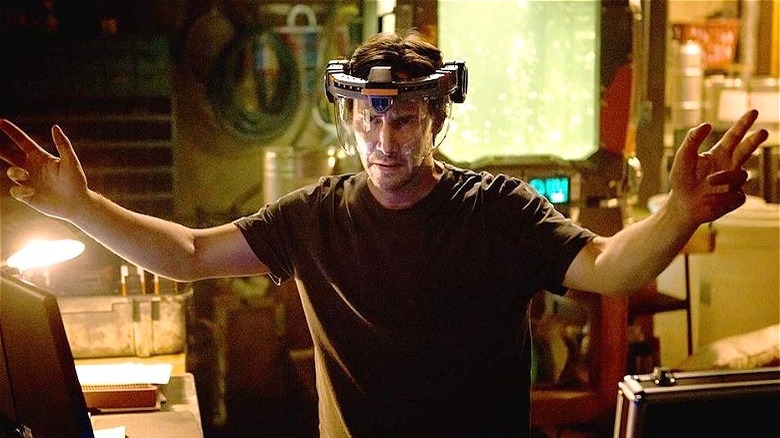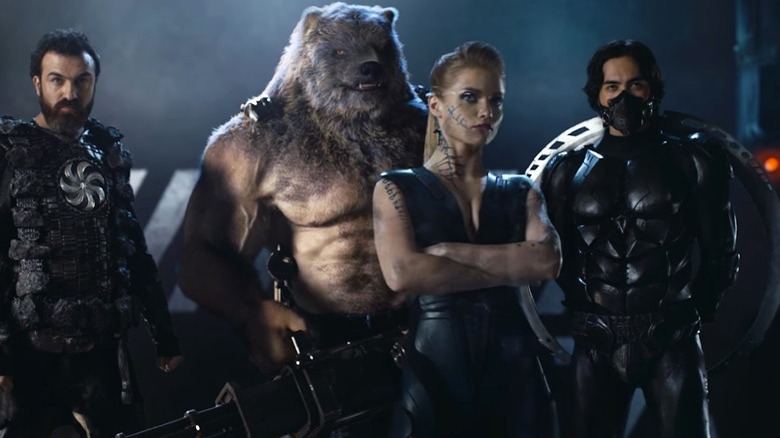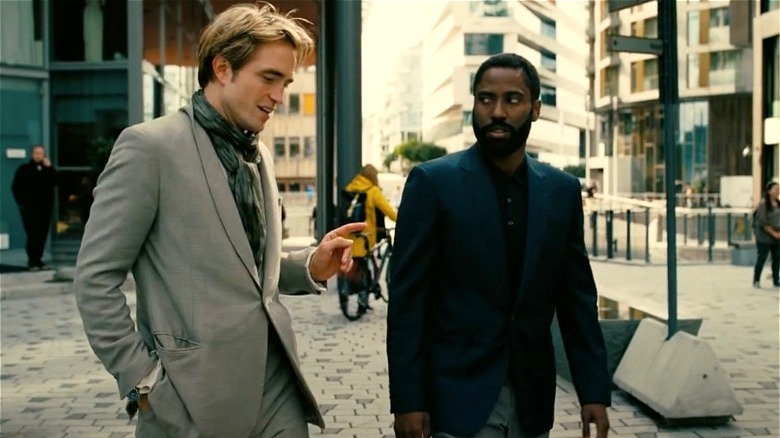The 15 Worst Sci-Fi Movies Of The 21st Century (So Far)
Science fiction pushes our imaginations beyond reality, but creating it is like "The Matrix" — sci-fi stories only work if we're plugged in for the ride. Anything that ruins the illusion breaks the architecture, and there's no colorful pill that we can take to recover.
Bad science fiction can mistake what it means to tell an epic tale, bloating itself with unneeded characters, haphazard worldbuilding, and incoherent plots. Without consistent internal logic, victories feel unearned, while the audience is frustrated by questions it shouldn't need to ask. Pretentiousness is a seductive pitfall when it comes to sci-fi, especially when it's written by people who forget that curiosity and wonder should be shared, not locked away. And then, sometimes, a movie just sucks.
Terrible science fiction movies forget to be entertaining, forget how to make us wonder, and worst of all, make us question our love for the genre. Here are the worst sci-fi movies of the past 20-plus years, including what went wrong (when we can tell), and what you should watch instead. Filmmakers, don't make movies like these.
Final Fantasy: The Spirits Within
In 2001, video game developer Square-Enix was still SquareSoft, a name that heralded brilliant, if occasionally arcane, role-playing games. In particular, Square was a master of creating beautiful CGI cutscenes that delivered its games major plot beats. So, the news that Square was forming a movie division and was going to give a realistic, all-CGI film a shot was bold, but not a leap. However, Square Pictures made one movie and one animated short before it was quietly subsumed by Square's Visual Works cutscene studio, so it's pretty clear how this experiment turned out.
The resulting film, "Final Fantasy: The Spirits Within," has an excellent voice cast that includes Ming-Na Wen as Square's premier CGI actress, Aki Ross, who was presented as the next big thing. She wasn't. The visuals in "Final Fantasy: The Spirits Within" are gorgeous. Unfortunately, the story is nonsense, with almost no connection to the "Final Fantasy" video games. And the unkindest cut of all? The winner of the race to be the first successful digital star wasn't Aki but, arguably, Hatsune Miku.
The Adventures of Pluto Nash
Few remember "The Adventures of Pluto Nash." Hopefully, one of them is Eddie Murphy. Murphy is the centerpiece of an all-star cast, riding high on a career shift that saw him go from an edgy '80s standup and action-comedy star to the lead in crowd-pleasing family flicks. The director, Ron Underwood, made the cult hit "Tremors," as well as "City Slickers," which proved that he could wrangle comedy giants.
Yet something went deeply wrong with "Pluto Nash." It's hard to put a finger on where the problems start, but the film is as hilarious as "Dunkirk." On paper, the premise is a wacky winner. It has a space Mafia and real estate shenanigans on the Moon. It has Murphy as a crook who's turning over a new leaf. It has John Cleese and Joe Pantaliano.
It also has a 4% on Rotten Tomatoes, and frankly, that's too high. The movie has no thematic heart, and strands great actors in inexplicable places. The twist, which involves cloning, is nonsensical. Murphy's "Dolemite Is My Name" is on Netflix. Watch that instead.
Stealth
In 1983, "Jaws" star Roy Scheider starred in "Blue Thunder," a film about a cutting-edge helicopter designed for urban pacification, setting the bar for stories about political corruption and military overreach. By contrast, in 2005, some generically pretty people are involved in testing an AI-controlled craft in "Stealth," and no one learns anything useful.
"Stealth" doesn't have the courage to indict anyone for the failures of an abusive military program. The gimmick that sets off the AI-controlled stealth fighter is stolen from "Short Circuit." A bolt of lightning is enough to scramble the fighter's machine-learning brain — anyone that stayed awake in high school science should know this is not how lightning works on an airborne craft, but that's the least of this movie's problems.
A love story that feels shoehorned in, bad science, bad military tactics, and much more make this a miserable film experience. "Blue Thunder" pops up on cable. "Stealth" pops up in Wal-Mart dollar bins.
Transformers: The Last Knight
In 1986, Hasbro made its first mistake with regard to the Transformers franchise when it slaughtered everyone's favorite robots on the big screen. Gen X kids have a slew of traumatic movie memories to choose from, but watching Optimus Prime's bright colors fade to grey is way up there. Then, in 2017, Michael Bay released "Transformers: The Last Knight," proving once again that people refuse to learn from their mistakes.
By this point, the Transformers franchise was in decline, and the ongoing character assassination of Optimus Prime hurt more than his death. A Transformer can be resurrected by clever writing or an Allspark ex machina, but taking away Optimus Prime's unshakable faith was a baffling decision. "The Last Knight" doesn't improve matters. Morgan la Fay is re-imagined as a robot sorceress named Quintessa, King Arthur's knights are involved, and whoever greenlit The Order of Witwiccans should step on a Lego once a day.
After Earth
Nepotism is an unremarkable fact of Hollywood, until it goes wrong. Cue "After Earth." In this decaying slice of pulp science fiction, Will and Jaden Smith play a father and son who feel like they've never met before crossing paths at craft services on the first day of filming. The plot is basic, hemmed in on all sides by outdated science fiction tropes and bad character names. Cypher Raige is a good name in a Japanese role-playing game. In "After Earth," it's a reason to laugh every time it's said.
M. Night Shyamalan can be accused of many things, but phoning in his work isn't one of them. He's dedicated to his premises, and he excels at creating a sense of moody atmosphere. But here, the director's seat could have been filled by a Geralt of Rivia body pillow. Check out 1985's "Enemy Mine" instead — all the same survivalist tropes, but with something useful to say about cultural empathy.
Skyline
There was an outbreak of eye-straining blue cinematography going on in 2010, but only "Skyline" turned it into a plot point. Icy beams are the first sign that something's gone wrong, hypnotizing and abducting Los Angeles residents as dawn breaks. No one's ever done a study on why so many alien invasions start in LA — aliens could establish a foothold in Nebraska, and clean up the world capitals by Sunday brunch. Clearly, the universe is not sending us their brightest.
"Skyline" is a retread of zombie outbreak tropes with a science fiction exterior. There's nothing interesting or intelligent about this movie, and none of the characters are worth caring about. Yes, it was filmed in the same building one of the directors lives in. That's fair. But it does lend a sameness to the events, without any emotion to imbue those familiar-looking walls with meaning. "Night of the Living Dead" codifies the tropes this movie wastes — skip this, and watch that.
The Cloverfield Paradox
Bad Robot and J.J. Abrams thought they'd managed something by remixing a script called "God Particle" into another entry in their Cloverfield anthology. It's a gag that worked to great effect with "10 Cloverfield Lane," with its eerie "Twilight Zone" flavor. But "The Cloverfield Paradox" doesn't launch.
The plot is ugly fare, set off by a poorly explained misuse of particle accelerator technology. It's a garbled take on quantum entanglement, with the risks of opening up Lovecraftian alternate timelines literally called the Cloverfield Paradox. It's an audacious move, the sort of in-universe stupid line that needs Samuel L. Jackson to deliver it. Here, though, it plops like a dead fish.
The movie doesn't go out of its way to do anything intelligent, fun, or self-aware. It is deadly serious about its nonsense, and the ending, which seems to drop baby Clover into the ocean for some New York-toppling fun, isn't enough to make the movie worthwhile.
Battleship
It's another blue science fiction movie, and it's based on a tabletop game that's been around in one form or another since before World War I. It's 2012's "Battleship," and despite all efforts to the contrary, it exists.
There are aliens in this movie. In case anyone was confused, the original game does not have aliens. There's no reason for them to be here, really. They show up intent on destruction. Liam Neeson is in this movie, which is not as mysterious but does leave him with not a whole lot to do. Rihanna is in this movie, which is shameless stunt-casting of the highest order.
The movie bridges stupidity and brilliance with how it acknowledges the original game, when it uses NOAA warning buoys to triangulate where and how to sink the otherwise untraceable enemy battleships. It's not enough to make the movie worth it.
Valerian and the City of a Thousand Planets
European comics are like American comics. There are good ones and bad ones, but the ones we get to read here are often their best. Dargaud is one of the best publishers, with titles like "Blacksad," "Asterix," and the "Válerian" saga. 2017's "Valerian and the City of a Thousand Planets" should have been another powerful moment for European comics onscreen, uplifting this French space opera into something special.
Instead, Luc Besson's passion project became a worse "Barbarella." That ludicrous, stylish cult film, also based on a French comic, has a heart. "Valerian" is the silver screen equivalent of corn flakes. It's dry, generic, and seemingly designed to suck all the passion out of the room. Much has been said about the lack of chemistry between Valerian and Laureline, yet not many people understand that this failed dynamic undermines the entire film. It's the bedrock of the comic. It's like making an "X-Men" movie without any X-Men in it.
Terminator: Dark Fate
Critics chose to be kind to "Terminator: Dark Fate." They shouldn't have. The sixth movie in a franchise that should've been Skynetted out to pasture four movies ago is slightly better at the expense of the last things that made it special. Yes, it's nice to see Linda Hamilton and Arnold Schwarzenegger again. But not like this.
After five other films that came up with its own time travel rules and then broke all of them, this one's timeline makes even less sense. Sarah Connor's fight to save the future of her son is thrown out a window in favor of fanservice. Imagine a version of "Kill Bill" in which Beatrix Kiddo emotionlessly runs over her daughter on the way to have pancakes at the diner that opens "Pulp Fiction." Afterward, she joins up with Travolta and Sam Jackson. That's the level of thought that went into the plot of "Dark Fate."
Gemini Man
Will Smith has trouble finding science fiction stories that fit him, and it's bad luck that he's on this list again. 2019's "Gemini Man" can't lay any responsibility on Smith this time. The faults rest in the overworked script, a pointlessly bombastic action-SF film that shares scant DNA with its original writer's work.
A good story shouldn't sound like a game of Telephone, and yet that's what happened to writer Darren Lemke. His pitch floated around Hollywood for two decades, attracting big name stars like dandruff. All of them shook free until Will Smith and Ang Lee remained. Not much else did. Lemke seems as confused as everyone else with the results.
There's something poignant buried inside "Gemini Man," the idea that a clone could change the course of their destiny and become a person in their own right. That's not what's explored. It's an epilogue tag, cutting off before something meaningful happens.
Battlefield Earth
With a new century came a renewed sense of hope, as we all looked for signs as to what our future would hold. In May 2000, we received a clue — if only we had understood the warnings. That's when "Battlefield Earth" was unleashed, and with it came an omen about how badly this 21st century was going to go.
Based on the first half of the novel by L. Ron Hubbard, John Travolta's blockbuster boondoggle has a bog-standard "chosen one" leading a rebellion. It features more Dutch angles than you can shake a copy of "Dianetics" at, and every single one is pointless. The Psychlos have the plumpest plastic codpieces this side of Sting's Feyd-Rautha. They're brought low by their arrogance, underestimating the potential of a walking slice of Wonder Bread named Jonnie Goodboy Tyler. That name isn't a crime, but it should be. If you like alien invasion movies, stick with "Edge of Tomorrow."
Replicas
Everyone loves Keanu Reeves, but his record with science fiction is terrific or awful with little middle ground. 2019's "Replicas" is the latter. It's an exhausting movie that makes "Johnny Mnemonic" look good. It starts with the bioethical implications of cloning, which is great for science fiction to explore. Unfortunately, the plot itself is "Sophie's Choice" slapped together with "RoboCop 2."
That's not an exaggeration. Keanu's family dies in an accident, and, brilliant neuroscientist that Keanu is, he uploads his family's neural maps into cloned bodies. All save his youngest. However, due to a vague understanding of telomeric aging, success is on a timer. There's also a plot about uploading brains to android super-soldier bodies, but they tear themselves apart once they wake up from the procedure. It all somehow leads to a cynically happy finale. Stop the movie after the car accident.
Guardians
In 2017, a band of heroes came together to stop a super-powered threat. One has affinity with an animal. Another is a martial master. Their nigh-immortal leader is infused with a patriotic spirit. No, we're not talking about "Justice League." This is Russia's "Guardians," a movie so bad that even the state-owned media was calling it one of history's worst.
The guy with the animal magnetism is a werebear, which brings up the question of why there isn't a Russian horror subgenre all about werebears. The costumes look like they were ripped from "Superman II." The CGI isn't amateur-level — amateurs have passion. The internal logic of the film is nonexistent, with plot holes so large the werebear could scamper through. I assume this movie is what's playing inside of Red Guardian's skull at all times. Sometimes you just gotta know when to quit. This movie doesn't.
Tenet
Like George Lucas, Christopher Nolan has a terrific imagination, and when given a script or a co-writer, the results are wondrous. But leave him to his own devices, and Christopher Nolan will make a pretentious film about how Christopher Nolan interprets what Christopher Nolan feels. "Inception" took its metaphors about the dreams required to fuel the creative process seriously. Its success gave Nolan the freedom to go further.
What he made was "Tenet," an inaudible flick with vague metaphors about posterity and free will. It's a neatly arranged mess. The Sator square structure Nolan chooses is clever, but creates a restrictive environment that doesn't allow the plot or its characters to breathe. But since these characters are bland archetypes used to explore Nolan's latest identity crisis, nothing matters. Just watch "Primer." That takes a few watches to make sense, too, but it does so much more with a lot less.
